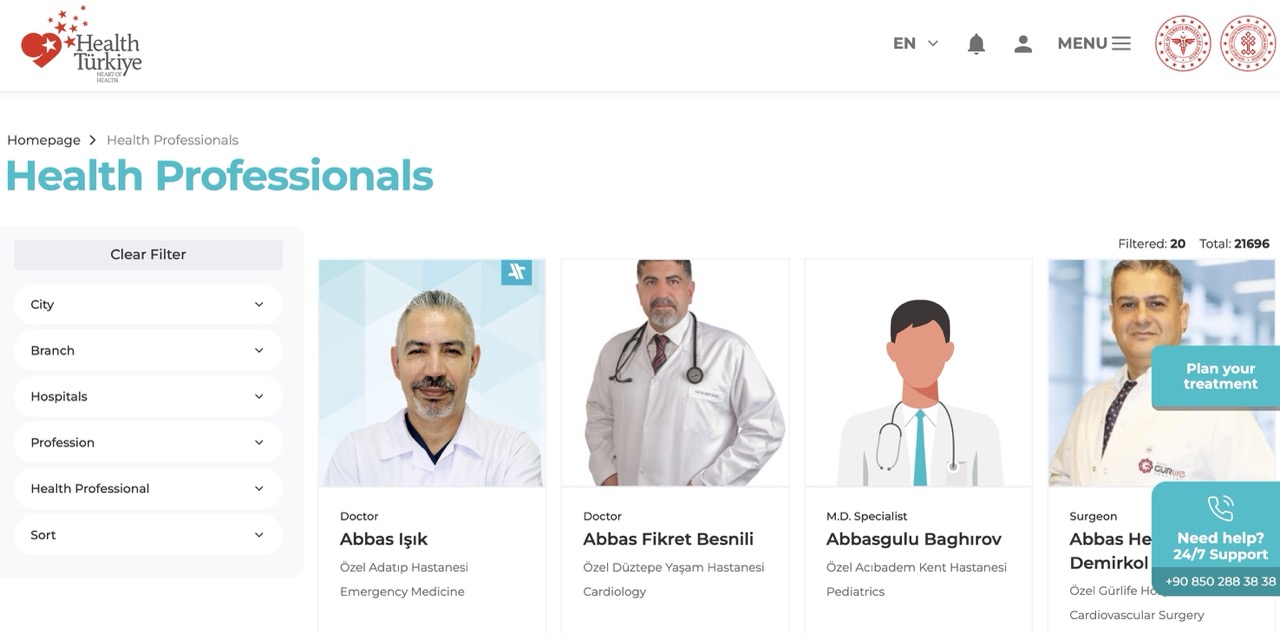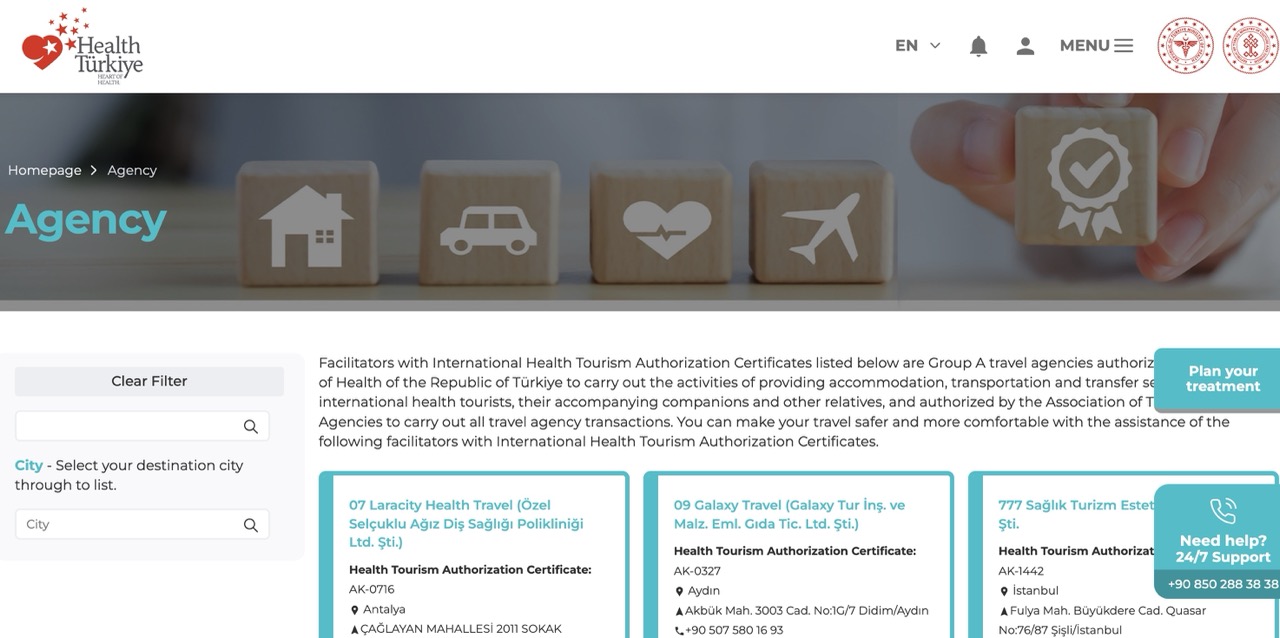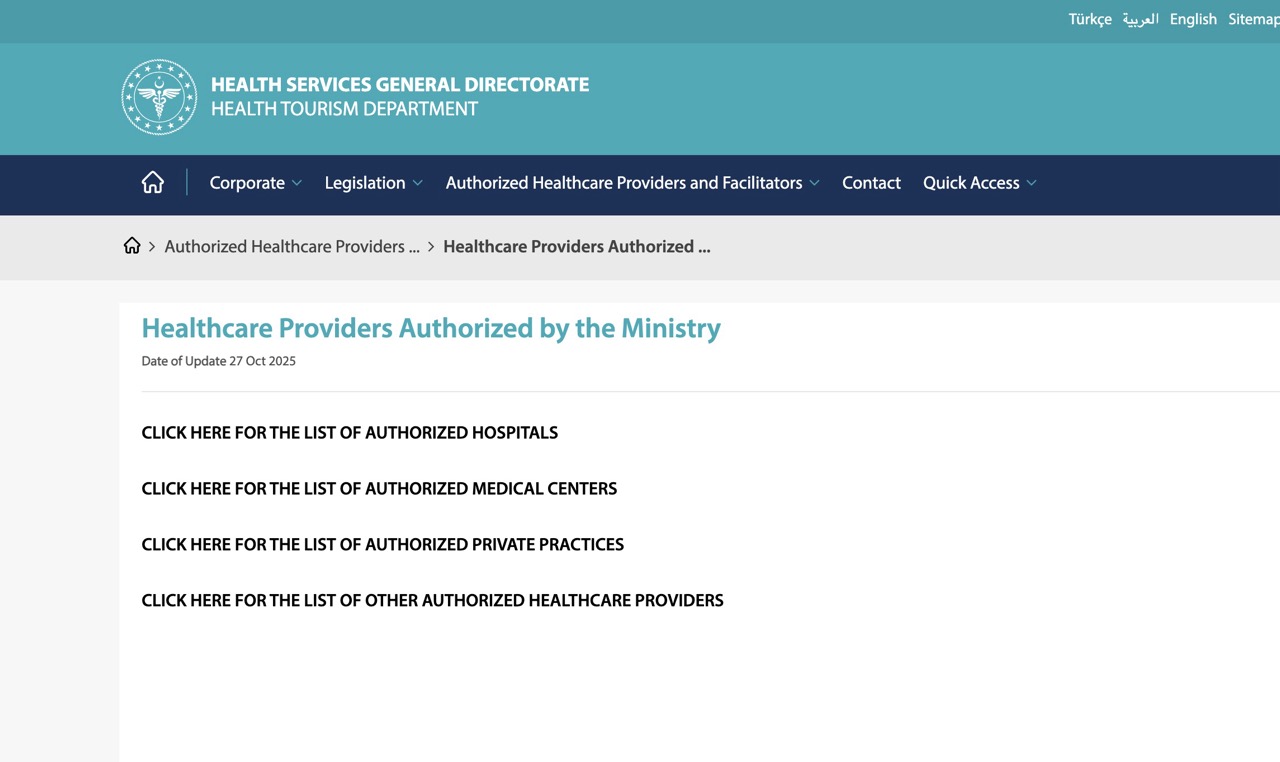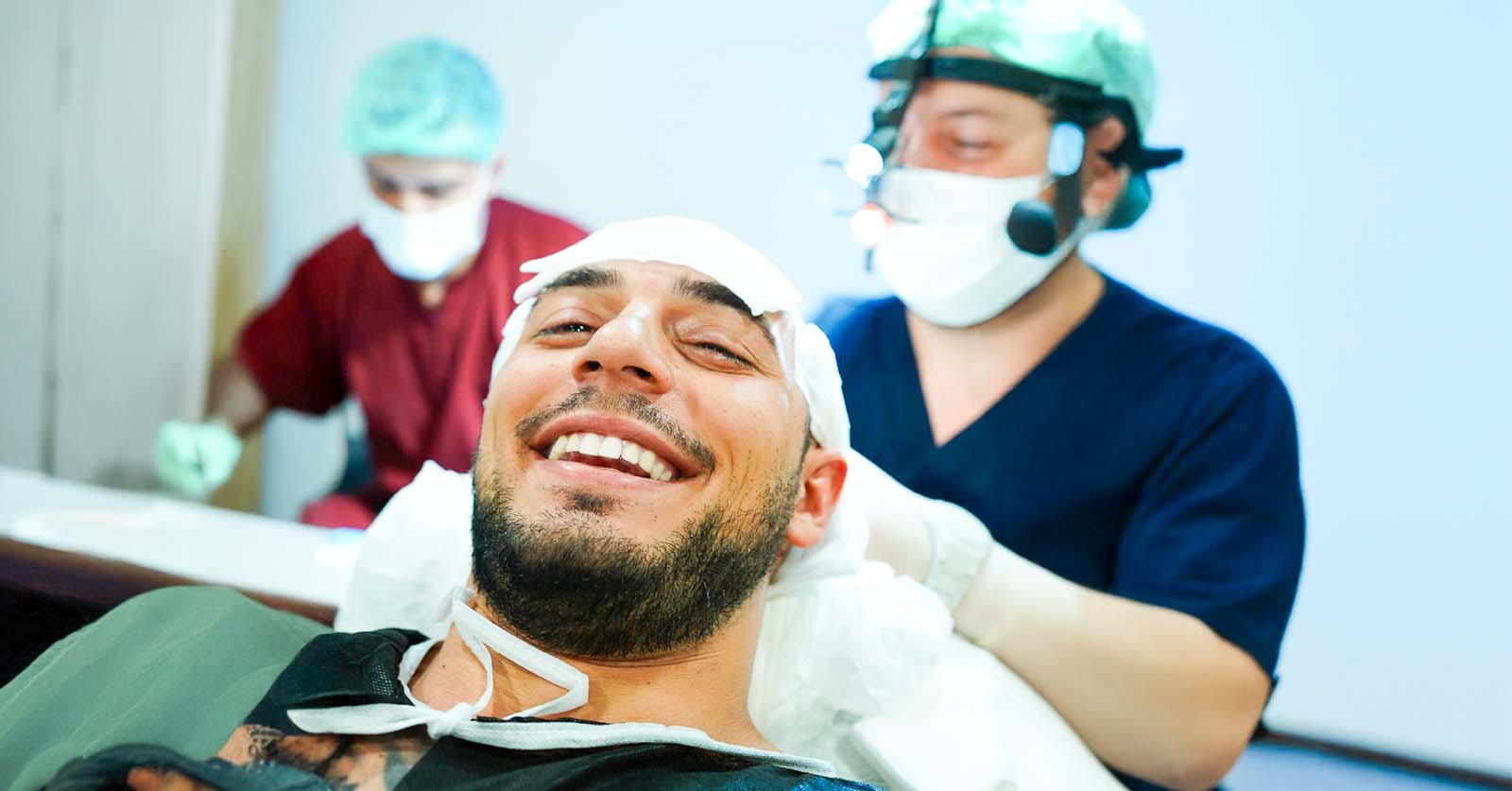Booking a hair transplant in Istanbul shouldn’t feel like decoding a puzzle. Flights, clinics, consultations, deposits, aftercare that it’s easy to get lost in details when what you really want is confidence that you’re making the right choice.
Our step-by-step guide will explore how to book a hair transplant in Istanbul with clarity. From choosing the right clinic, to scheduling your consultation, to arriving and confirming your surgery date, you’ll get a practical roadmap that turns uncertainty into an organized plan.
Step 1: Verify the Clinic and Surgeon Before You Book
If you do one thing before booking your hair transplant in Istanbul, let it be this: confirm the clinic’s license. It takes less than five minutes and could save you from irreversible damage.
According to the Turkish Ministry of Health, all hair transplant clinics must hold a “Private Health Institution License” and employ at least one responsible physician, the doctor legally accountable for every procedure performed on-site.
Yet hundreds of unlicensed centers operate under generic brand names, renting operating rooms by the day or performing surgeries in hotel suites.
How to check a clinic’s license in minutes
Visit the official Ministry of Health “Health Professionals” database on healthturkiye.com, that this is where you can confirm hospitals, doctors, and clinics.

For “Facilitators with International Health Tourism Authorization Certificates”, find them on healthturkiye.com. It can be hard to search but you are getting familiar.

- Search the healthcare professional, hospital, agency, or the clinic’s full legal name.
- Check that the address matches what’s listed on their website.
- Make sure there’s a responsible doctor listed. That’s the person legally accountable for medical procedures performed there.
Cross-check through USHAŞ, the official body overseeing medical tourism. Visit the USHAŞ official website and look for the “Authorized Health Institutions” section from https://shgmturizmdb.saglik.gov.tr

USHAŞ can confirm whether a clinic is approved to treat international patients.
According to ISHRS 2024 safety reports, nearly 70% of post-transplant complications worldwide involve clinics where technicians, not doctors, performed the surgery. A two-minute verification today can spare you months of regret later.
Step 2: Share Photos and Book a Real Consultation
After you’ve verified that the clinic and surgeon are legitimate, the next step is a proper medical consultation, not a quick message exchange or an instant quote from your selfies.
A true consultation sets the tone for your entire hair transplant journey in Istanbul. It’s where the surgeon evaluates your donor capacity, discusses technique options (FUE, DHI, Sapphire), and maps out what’s medically possible, not just what looks good on paper.
How to prepare and what to send
A qualified clinic will ask for high-quality photos showing all key angles:
- Front (with hair pulled back if long)
- Top (to show density)
- Crown (to assess coverage needs)
- Back and sides (donor area)
- Side profiles (for hairline analysis)
Use natural daylight and avoid filters, the clearer the photo, the more accurate your plan will be.
According to USHAŞ and the Turkish Ministry of Health, a real pre-op assessment should include:
- A review of your medical history (any chronic illnesses, medications, allergies)
- A discussion of your hair loss stage and expected progression
- An honest evaluation of whether you’re a suitable candidate
- Clear explanation of the technique and graft estimate
Istanbeautiful team insight: “We’ve seen both extremes, some clinics reply within five minutes with a price, others schedule a 20-minute video call where the doctor actually analyzes your scalp. The second type is the one worth trusting.”
What a real consultation feels like
- It’s two-way — you ask questions, not just answer them.
- It’s specific — the surgeon explains why a technique fits you.
- It’s documented — you’ll receive a written summary or proposal afterward.
- It’s pressure-free — there’s no countdown, no “book today for discount” push.
Dr. Güncel Öztürk (HairNeva Clinic): “Every scalp is a blueprint. If a clinic offers a price before even studying your donor area, that’s not consultation, that’s guesswork.”
A strong consultation ends with a clear, personalized plan, not a package deal. You should understand the number of grafts, recovery timeline, and total cost, all before you ever step on a plane.
Step 3: Receive a Written Plan, Quote, and Contract
Once your consultation is complete, a professional clinic will send you a written treatment plan and formal quote, not a screenshot, not a voice note. This paperwork is your first real sign that you’re dealing with a licensed medical facility, not a marketing agency.
A proper hair transplant quote in Istanbul should feel like any other medical document, clear, detailed, and verifiable. It protects both sides: you as a patient, and the doctor as a licensed practitioner under the Turkish Ministry of Health.
What a real quote must include
- The full name of your surgeon and their registration number
- The exact technique to be used (FUE, DHI, or Sapphire FUE)
- An estimated graft count (not “unlimited”)
- A clear price breakdown, including aftercare and medications
- The clinic’s full legal name and address (matching the license)
- Post-op care contact information
- The deposit amount, payment method, and refund conditions
According to the ABCS, most international patient disputes stem from verbal promises or missing paperwork. Without a written quote or signed consent, it becomes nearly impossible to file a complaint with Turkish authorities or USHAŞ if something goes wrong.
Make sure both your quote and contract are:
- Signed by the doctor, not a coordinator.
- Stamped with the clinic’s official seal.
- Written in English or bilingual format (so you fully understand).
- Dated, with a clear timeline for your booking.
What to watch out for
- Prices that change after arrival (“extra grafts”, “upgraded tools”)
- Verbal guarantees (“100% growth”, “zero pain”)
- No signature or printed name of your surgeon
- “Unlimited grafts” or “VIP package” offers with no specifics
A real clinic gives you clarity before you ever send money. The paperwork is proof that your treatment is regulated, not improvised.
Step 4: Book Flights & Hotel (3–4 Nights Typical)
Once your treatment plan and contract are confirmed, it’s time to plan the trip, and this part matters more than people think. A smooth travel schedule keeps your surgery day calm, your recovery comfortable, and your results safe.
According to USHAŞ, the average hair transplant trip to Istanbul lasts 3–4 nights, depending on your flight schedule and chosen technique. Here’s how to organize it without stress or surprises.
When to arrive and how long to stay
- Day 1: Arrival and rest. Avoid booking same-day surgery; jet lag and dehydration affect blood flow and graft survival.
- Day 2: Pre-op consultation, final hairline design, and surgery.
- Day 3: Post-op check and first hair wash (performed by clinic staff).
- Day 4: Optional follow-up, sightseeing at a relaxed pace, or flight home in the evening.
Arriving one day early allows your body to settle and gives the clinic time to run your pre-op blood tests (CBC, HIV, Hepatitis B/C, ECG if needed). These are required by the Turkish Ministry of Health for all surgical patients.
Choosing your airport

Istanbul has two main airports:
- Istanbul Airport (IST): closer to most major clinic districts like Şişli, Nişantaşı, Beşiktaş and Levent.
- Sabiha Gökçen (SAW): better if your clinic or hotel is on the Asian side (Kadıköy, Ataşehir).
Most clinics offer airport transfers, but confirm your pickup times and driver contact in writing before your flight.
Where to stay

Some clinics include hotel accommodation in their packages, but check:
- The hotel’s location (it should be near your clinic for short transfers).
- The hygiene rating (verified hotels matter post-surgery).
- Whether the price includes breakfast, you’ll need light meals for medication.
If you prefer to book independently, neighborhoods like Beşiktaş, Taksim, Galata, and Kadıköy offer safe, central hotels near most top-rated clinics.
What to pack
- Loose button-up shirts or zip hoodies (no pullovers after surgery).
- Neck pillow for sleeping upright the first few nights.
- Saline spray, sunglasses, and a soft hat (the clinic will advise when you can wear it).
- Travel insurance that covers medical tourism, optional but smart.
Many top clinics offer all-inclusive packages
Here’s the part many travelers love: the best hair transplant clinics in Istanbul handle everything for you. Most reputable centers now offer all-inclusive packages that typically cover:
- Airport transfers (IST or SAW)
- Hotel accommodation in a 4–5-star partner hotel
- Surgery and anesthesia
- Medications and aftercare products
- Translation and coordination services
It’s convenient, especially if you’re flying in from abroad. But read the fine print, the clinic must still be Ministry-licensed and the surgery must be doctor-led. Don’t let the comfort of an all-inclusive package replace due diligence.
Step 5: Pre-Op Tests and Final Hairline Design
Your pre-operation day sets the stage for everything that follows. The best hair transplant clinics in Istanbul treat this step like a medical procedure, not a formality. It’s where your safety, design, and long-term success come together.
Medical tests and preparation
Every Ministry of Health–licensed clinic must perform basic pre-op testing before surgery. Expect:
- Complete blood count (CBC) – checks infection or anemia risk.
- Hepatitis B/C and HIV screening – required by Turkish regulations.
- ECG (electrocardiogram) for patients over 40 or with heart history.
- Blood pressure check and brief general health evaluation.
According to USHAŞ, these tests are mandatory for surgical clearance and typically take 20–30 minutes. Avoid clinics that skip or rush this stage, it’s the first line of patient safety.”
Hairline design
After clearance, your surgeon will sit down with you to plan the hairline. This isn’t about drawing a line with a marker; it’s about balancing anatomy, age, and facial harmony. The best hair transplant doctors in Turkey consider:
- Age-appropriate design: avoiding an unnaturally low or sharp line.
- Density planning: ensuring enough grafts remain for future sessions.
- Angle and direction: matching your natural growth pattern for realism.
The ISHRS also highlights that personalized design is one of the clearest indicators of a doctor-led operation.
Technique confirmation
This is when your final technique (FUE, DHI, or Sapphire FUE) is reconfirmed. The doctor will explain why it fits your case, perhaps Sapphire for higher density, DHI for refined hairlines, or FUE for wider coverage. Ask how many grafts will be taken and where from.
Step 6: Surgery Day, First Night, and First Wash
The big day. After all the planning, travel, and design, this is where everything comes together. The best hair transplant clinics in Istanbul keep this day structured, calm, and medically focused, not rushed or chaotic.
What to expect on surgery day
You’ll arrive at the clinic early, usually between 8:00 and 9:00 a.m. The staff will confirm your medical forms, take pre-op photos, and prepare the donor area. Your doctor will review the plan one last time, the technique, graft number, and zones.

A local anesthetic is applied to numb both the donor and recipient areas. You’ll feel pressure, not pain. Depending on your method:
- FUE / Sapphire FUE: grafts are extracted manually or with a micromotor.
- DHI: follicles are loaded into implanter pens and placed directly.
The process takes 6–8 hours with short breaks for meals and rest. Licensed clinics never rush, they limit the number of surgeries per day so the doctor can focus entirely on you.
Dr. Gökhan Bilgin: “Good surgery is like a rhythm, steady, precise, unhurried. You can always tell when a clinic cares more about grafts than numbers.”
After surgery: the first night
Your donor area will feel tight and slightly numb. You’ll receive antibiotics, painkillers, and sometimes anti-swelling medication. Most clinics provide a travel pillow to help you sleep upright and protect the grafts. Avoid touching, scratching, or leaning against anything for the first 48 hours.
Licensed clinics will schedule a next-day checkup to inspect the grafts and ensure there’s no bleeding or swelling. You’ll likely wear a soft headband to reduce forehead swelling, normal and temporary.
The first wash: your most delicate step
On day 2 or 3, you’ll return for your first hair wash, performed by clinic staff. This step removes crusts gently and teaches you how to wash at home. You’ll use a foam shampoo and saline spray, applying it with soft taps, never rubbing.
According to Healthline and PubMed clinical reviews, proper washing and scalp hydration during the first week improve graft survival and reduce infection risk by nearly 20%.
Step 7: Remote Follow-Ups (1, 3, 6, and 12 Months)
Your hair transplant journey in Istanbul doesn’t end when you leave the clinic, it continues long after you’ve gone home. The real growth happens over the next 12 months, and how your clinic supports you during that time often determines your final result.
The best hair transplant clinics in Turkey stay connected through structured remote follow-ups, not automated messages. You’ll usually be assigned a coordinator or nurse who monitors your recovery and provides ongoing care guidance.
The typical follow-up timeline
- Week 1: Healing check, your clinic reviews photos of the donor and recipient areas to ensure no infection or trauma.
- Month 1: Shedding phase, most transplanted hairs fall out. Your coordinator confirms it’s normal and advises how to maintain scalp hygiene.
- Month 3: Early regrowth, fine new hairs begin emerging. Clinics may recommend PRP or nourishing serums to strengthen follicles.
- Month 6: Visible growth, density starts to form, and you’ll see noticeable change. Adjustments to washing or scalp care may be suggested.
- Month 12: Final evaluation, full results visible. The clinic requests detailed photos and provides final growth feedback.
Dr. Güncel Öztürk: “Results aren’t a one-day event; they’re a year-long collaboration. Patients who stay in touch heal faster and look better, it’s that simple.”
What professional aftercare communication looks like
- Regular WhatsApp or email check-ins with a named staff member
- Quick response times for any redness, itching, or shock loss concerns
- Access to your surgeon for complex questions (not just a translator)
- Continued support for medication routines and nutrition tips
Keep everything documented
Save your receipts, consent forms, and all chat transcripts. They prove that your treatment was handled professionally and help you if you ever need to file a report. A great clinic doesn’t disappear after you leave Istanbul, it stays with you until every graft matures.
Pricing Truths & Red Flags in Istanbul
Here’s the part most people get wrong: price doesn’t tell the whole story, but it does tell a lot. Istanbul’s range of clinics means you’ll see everything from $700 “deals” to $5,000 “exclusive” packages.
The sweet spot for a doctor-led, Ministry-licensed hair transplant in Turkey usually falls between $2,500 and $3,500 USD, depending on the technique, surgeon, and graft count.
According to USHAŞ and the Turkish Ministry of Health, transparent pricing is a legal requirement for licensed medical tourism providers. Every patient should receive an itemized breakdown in writing, including:
- The surgeon’s full name and medical registration number
- Technique type (FUE, DHI, Sapphire FUE)
- Estimated graft count and zones
- Post-op medication and aftercare inclusions
- Payment method and receipt details
Anything missing from that list is a signal to pause.
Red flags to avoid
1. “Unlimited grafts”: There’s no such thing. Donor areas have natural limits. Overharvesting causes permanent thinning and patchiness.
2. “VIP package” with vague inclusions: If the details aren’t written, the perks aren’t real.
3. “Book today” or “limited-time offer” pressure: Licensed clinics don’t run flash sales on surgery.
4. No receipt or tax invoice: Unregistered clinics avoid traceable payments.
5. Overcrowded schedules: Clinics performing 10+ operations per day often rely on technicians to keep up. That means less doctor time, and higher complication risk.
Booking Checklist: Your Quick Pre-Trip Reference
Before you finalize your hair transplant in Istanbul, run through this simple list. It’s the same framework our Istanbeautiful team uses when reviewing clinics, practical, verifiable, and quick to complete.
Clinic Verification
- Checked the Turkish Ministry of Health database for an active license.
- Confirmed clinic’s name and address match official records.
- Received written confirmation or listing from USHAŞ (International Health Services Inc.).
- Verified the responsible doctor’s name and registration number in the Turkish Medical Association directory.
Surgeon & Consultation
- Had a video or in-person consultation with the actual doctor (not just a coordinator).
- Discussed technique options (FUE, DHI, Sapphire FUE) with clear medical reasoning.
- Received an honest graft estimate based on donor capacity.
- Reviewed medical suitability (blood tests, medications, or conditions disclosed).
Contract & Payment
- Obtained a signed and stamped treatment plan listing doctor, graft count, and cost.
- Read the refund and cancellation policy in writing.
- Received an official payment receipt (with tax ID).
- Saved copies of all emails, invoices, and WhatsApp conversations.
Travel & Accommodation
- Booked flights with at least one rest day before surgery.
- Confirmed airport transfers and hotel booking (if part of a package).
- Verified hotel cleanliness and proximity to the clinic.
- Packed button-up shirts, neck pillow, and medical documents.
Post-Op Care & Follow-Up
- Understood first-wash procedure (done at clinic or guided remotely).
- Received written aftercare instructions (medications, sleeping position, washing).
- Know the coordinator’s contact info for follow-ups.
- Scheduled photo updates for 1, 3, 6, and 12 months.
Important Questions & Answers
How far in advance should I book my hair transplant in Istanbul?
Most clinics recommend booking 3–4 weeks in advance. This gives you time for consultation, flight planning, and pre-op instructions. Popular surgeons may require up to two months’ notice, especially in spring and autumn, Istanbul’s busiest medical travel seasons.
How many days should I stay in Istanbul for a hair transplant?
Plan for 3–4 nights total. Day 1: Arrival and rest. Day 2: Pre-op tests and surgery. Day 3: Post-op check and first wash. Day 4: Optional sightseeing and flight home.
Can I book everything as an all-inclusive package?
Yes, many of the best hair transplant clinics in Istanbul offer licensed all-inclusive packages that include airport transfers, hotel accommodation, surgery, aftercare, and translation. Just make sure the clinic itself is Ministry of Health–approved and the operation is doctor-led, not technician-run.
How much deposit should I pay to secure a date?
Reputable clinics typically ask for 10–20% of the total cost as a deposit. Always pay via a traceable method (credit card or bank transfer) and ask for a receipt. Avoid full prepayments before arrival.
How do I know if my quote is fair?
Doctor-led procedures in Istanbul usually cost between $2,500 and $3,500 USD. Extremely low prices often mean technician-led surgeries or poor-quality environments. Verify the clinic’s license and ask for a written itemized quote with the doctor’s name.
What should I do if a clinic pressures me to book immediately?
Walk away. The Turkish Ministry of Health prohibits “limited-time offer” tactics for medical procedures. A good clinic respects your decision-making time and answers your questions calmly.
What if I need to reschedule?
Notify the clinic as soon as possible. Licensed centers include rescheduling clauses in the contract, you shouldn’t lose your deposit if you inform them in advance. Always keep written proof of the change.
Can I travel around Istanbul after the surgery?
Light sightseeing after the third day is fine, but avoid sun exposure, sweating, and crowded places for at least 7–10 days. Gentle activities like Bosphorus cruises or café strolls rather than Grand Bazaar marathons ae recommended.
What happens if the clinic stops responding after my surgery?
Contact USHAŞ or the Provincial Health Directorate with your documentation (invoice, messages, and contract). Both institutions handle medical tourism complaints for international patients.
Is Istanbul still safe and reputable for hair transplants?
Yes, Turkey remains one of the most trusted global hubs for hair restoration, thanks to strict Ministry licensing and growing oversight by USHAŞ. According to 2025 government data, more than 98% of licensed clinics passed their latest inspections.
Our Picks of the Best Hair Transplant Clinics in Istanbul
After years of reviewing clinics, interviewing surgeons, and visiting facilities firsthand, our Istanbeautiful team has built a trusted shortlist of the best hair transplant clinics in Istanbul, places that combine genuine medical expertise, transparent communication, and real patient care.
What stood out to us wasn’t just technology, though every one of them uses advanced FUE, Sapphire FUE, or DHI techniques, but the consistency of results and the way patients are treated from consultation to follow-up.
You can explore our full recommendations, along with surgeon profiles, technique details, price comparisons, and real patient insights, in our dedicated guide: Best Hair Transplant Clinics in Istanbul